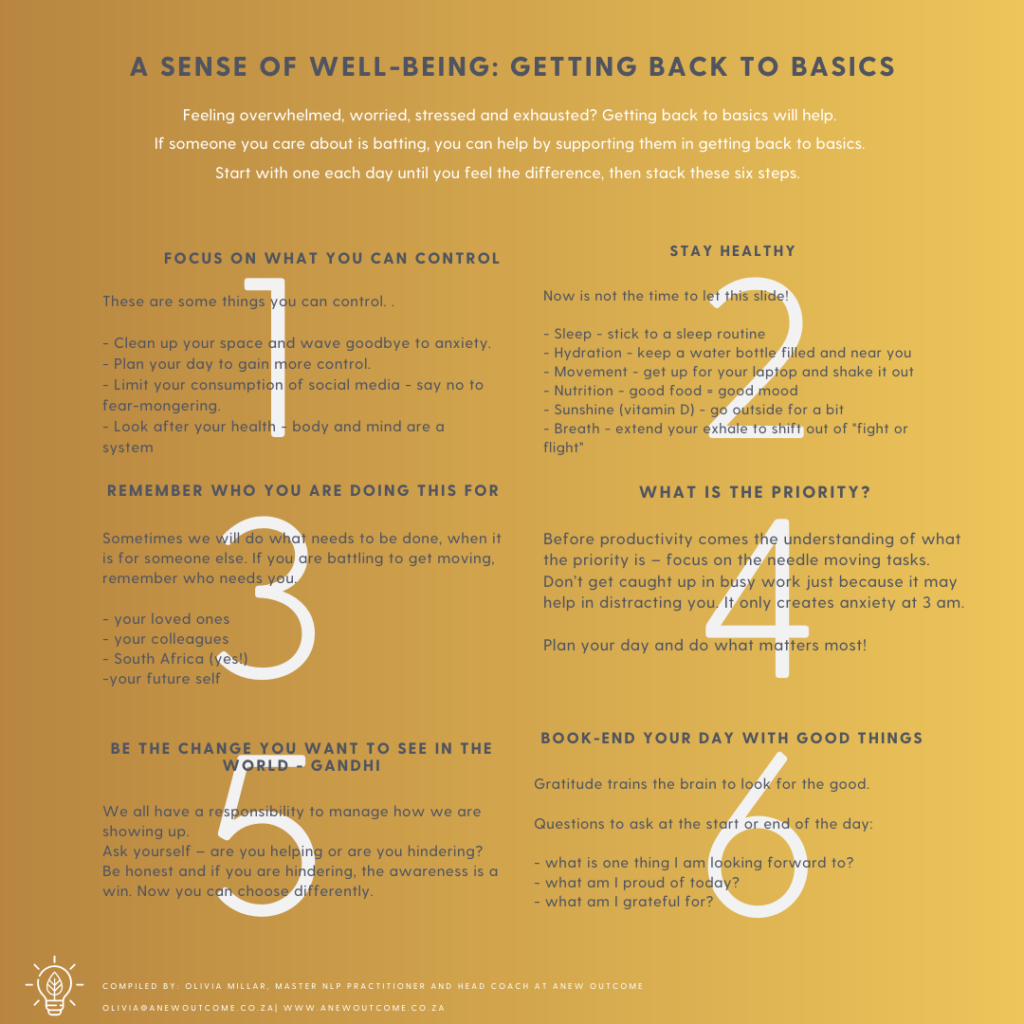A sense of well-being: getting back to basics
A survival guide for thriving in unprecedented times, Olivia Millar, a personal and business coach, shares how taking care of the basics creates well-being and invites a shift in perspective. If you are feeling overwhelmed, worried, stressed, and exhausted, these tips are for you.
Firstly, you are not alone! For the past 18 months, we are all facing concerns around health and safety; our own and our loved ones. Most recently, South Africans had to add physical safety concerns to the list.
“I say this because I am not in denial. I know these fears are real and they still exist. We also saw the country (for the most part) come together though, in the most beautiful way, and those of us old enough, got to register for the vaccine”, said Olivia Millar, Head Coach at Anew Outcome.
What can you start doing today to bolster your resilience, while taking care of the basics?
1. Focus on what you can control
Start with simple things. Your brain loves order and a sense of control.
- Clean up your physical environment because clutter adds to anxiety.
- Schedule your day, even if things do not go according to plan.
- Limit your consumption of social media and stay informed through reputable sources, not fear-mongers or fake news.
2. Look after your physical and mental well-being
Now is not the time to compromise your health. Your body, mind, and emotions are one system. This is not about aiming for perfection, but about getting back to basics.
- Sleep is important. Returning to a routine of going to bed and getting up at the same time trains your brain to produce melatonin at the right times. At least an hour before bed, stop scrolling on your blue light devices. The brain interprets this light as daylight.
- Hydration fosters physical and mental wellness. Keep your water bottle filled, even in winter. Try hot water with some lemon and keep warm at the same time. Denying your body water may increase anxiety and cause brain fog.
- Nutrition is the fuel that supports your body. Give it vitamins and minerals to keep your immune system strong.
- Movement and exercise regulate endorphins. Taking just two minutes to frequently move and shake your body out will break up the extended periods of sitting at the laptop that many people who work from home have become accustomed too.
- Soak up some sunshine and absorb vitamin D to be happy – literally. This also boosts your immune system.
- There is power in breathing. Extending your exhale is one of the quickest ways to move your body out of fight-or-flight. While taking your regular two-minute movement breaks, add in some deep exhalations.
3. Remember who you are doing this for
If you are already taking care of the first two points, but still find productivity a battle, just remember your loved ones – starting with yourself. If you are a parent, your children need you. If you are a child, your parents need you. As a knowledge worker, you are in one of the best positions to keep contributing to the economy during the pandemic. If none of this moves you though, do it for the future opportunities you are creating for yourself.
4. What is the priority?
We are all feeling taxed, and we may not be the most productive at all times. The understanding of what the priority is precedes productivity. Focus on the needle-moving tasks. Do not get caught up in busy work just because it may help to distract you. This actually only drives up anxiety at the end of the day (or at 3 am, when you are staring at the ceiling). Plan your day and do what matters!
5. Be the change you want to see in the world
While it may sound whimsical, it is true. We all have a responsibility to manage how we are showing up. Ask yourself – am I helping or hindering? Being honest with yourself supports awareness. This cultivates personal mastery and power. Honest self-reflection allows you to choose differently.
6. Book end your day with good things
Research has shown that people with a gratitude practice are 25% happier. Start and end each day by focusing on the good. This can be something you are looking forward to, your achievements of the day, and everyone or everything you are thankful for. If finding things to be grateful for poses a challenge, get back to basics and ask yourself – what am I taking for granted?
Gratitude is not only a spiritual practice, it is a way to train your brain to seek out the positive things in life.
Apply these six steps to your home and workspaces. Invite your family and colleagues to take part too. If all six seem too much, start with one a day. Life may be challenging, but focussing on the basics may change your perceptions about what is possible. Safeguarding your mental and physical wellbeing will certainly change your perspective, and allow you to ask – what is the best that can happen?




